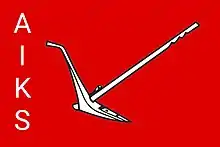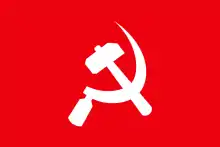All India Kisan Sabha (Ajoy Bhavan)
All India Kisan Sabha is the peasant or farmers' wing of the Communist Party of India. The Kisan Sabha movement started in Bihar under the leadership of Swami Sahajanand Saraswati, who had formed in 1929 the Bihar Provincial Kisan Sabha (BPKS) to mobilise peasant grievances against the zamindari attacks on their occupancy rights.[1]
 | |
| Formation | 11 April 1936, Lucknow, United Province, British Raj |
|---|---|
| Type | Peasant Organisation |
| Headquarters | Ajoy Bhavan, 15, Indrajit Gupta Marg, New Delhi, India-110002 |
| Location |
|
General Secretary | Atul Kumar Anjan |
Working President | Bhupinder Samber |
| Affiliations | WFTU Trade Union International of Agricultural and Forestry Workers |
Gradually the peasant movement intensified and spread across the rest of India. All these radical developments on the peasant front culminated in the formation of the All India Kisan Sabha at the Lucknow session of the Indian National Congress in April 1936, with Swami Sahajanand Saraswati elected as its first president.[2] The other prominent members of this Sabha were N.G. Ranga, Ram Manohar Lohia, Jayaprakash Narayan, Acharya Narendra Dev and Bankim Mukerji, and it involved prominent leaders like N.G. Ranga, E.M.S. Namboodiripad,Indulal Yagnik, Baba Sohan ding Bhakhna, Z.A. Ahmed, Pandit Karyanand Sharma, Pandit Yamuna Karjee, Pandit Yadunandan (Jadunandan) Sharma, Rahul Sankrityayan, P. Sundarayya, Ram Manohar Lohia, Yogendra Sharma and Bankim Mukherjee. The Kisan Manifesto, released in August 1936, demanded abolition of the zamindari system and cancellation of rural debts; in October 1937 it adopted the red flag as its banner.[3] Soon, its leaders became increasingly distant with Congress and repeatedly came in confrontation with Congress governments, in Bihar and United Province.
In the subsequent years, the movement was increasingly dominated by Socialists and Communists as it moved away from the Congress. By the 1938 Haripura session of the Congress, under the presidency of Netaji Subhas Chandra Bose, the rift became evident[3] and by May 1942, the Communist Party of India, which was finally legalised by the government in July 1942,[4] had taken over All India Kisan Sabha all across India, including Bengal where its membership grew considerably.[5] It took on the Communist Party's line of People's War and stayed away from the Quit India Movement which started in August 1942, though this also meant losing its popular base. Many of its members defied party orders and joined the movement. Prominent members like N.G. Ranga, Indulal Yagnik and Swami Sahajananda soon left the organisation, which increasingly found it difficult to approach the peasants without the watered-down approach of pro-British and pro-war, and increasing its pro-nationalist agenda, much to the dismay of the British Raj.[6]
Conferences and office bearers
- First conference held at Lucknow
President:Swami Sahajanand Saraswati General secretary:N.G.Ranga
- Second conference held at Faijpur on 25,26 December 1936
- Third conference held at Comilla now in Bangladesh on 11–14 May 1938
President:Swami Sahajanand Saraswati
- Fourth conference held at Gaya, Bihar on 6–10 April 1939
President: Acharya Narendra Deo. Swagtadhyaksh: Pandit Yadunandan Sharma
- Fifth conference held at Palasa Andhra Pradesh on 26–27 March 1940 in presidentialship of Baba Sohanasing Bhakhna.
Pandit Rahul Sanskrityan was set as president but he was arrested before conference so Sohansing Bhakhna elected as president.
- Sixth conference held in Patna on 29-30-31 May 1942.
President: Indulal Yagnik
- Seventh conference held at Bhakhna,Punjab on 1–4 April 1943.
President: Bankim Mukherjee.
- Eighth conference held at Vijayawada Andhra Pradesh on 14–15 March 1944
President: Sahajanand Saraswati
- Ninth conference held at Netrakona now in Bangladesh on 7–9 April 1945
President: Muzaffar Ahmed
- Tenth conference held at Secunderabad Aligarh on 22–26 May 1947
President: Karyanand Sharma.
- Eleventh conference held at Kananoor Kerala on 22–23 April 1953
President: Indulal Yagnik General secretary: N. Prasad Rao.
- Twelveth conference held at Moga Punjab on 13–19 September 1954
President: Indulal Yagnik General secretary:N.Prasad Rao
- Thirteenth conference held at Talasari, Dahanu-Maharashtra on 17–22 May 1955
President: Com.Nana Patil General se: N. Prasad Rao.
- Fourteenth conference held at Amritsar 28–30 September 1956
President: A.K.Gopalan.
- Fifteenth conference held at Bangaon West Bengal on 28 October to 3 November 1957.
- Sixteenth conference held at Mayuram District Tanjaur Tamil Nadu.
- Seventeenth conference held at Gazipur on 17–19 May 1960.
President:A.K.Gopalan General secretary: Bhavani Sen.
- Eighteenth conference held at Thrisoor on 30 March to 2 April 1961
President:A.K.Gopalan. General Secretary: Kavitet Sing Layalpuri.
- Nineteenth conference held at Amravati on 10–12 January 1968
President: Com.Teja Sinh Swatantra General Secretary: Z.A. Ahmed.
- Twentyth conference held at Barasat, West Bengal on 1–5 April 1970
President: Teja Sinh General Secretary: Z.A.Ahmed
- Twenty-first conference held at Bhatinda on 19–23 September 1973.
- Twenty second conference held at Vijayawada Andhra Pradesh on 7–10 June 1979
President: Z.A.Ahmed General Secretary: Indradeep Sinha
- Twenty third conference held at Barabanki Uttar Pradesh on 28–31 December 1986
President: Indradeep Sinha General Secretary:Y.V.Krishna Rao.
- Twenty fourth conference held at Madhubani Bihar on 16–19 June 1993
President:Com. Y.V.Krishna Rao General Secretary: Com. Bhogendra Jha.
- Twenty fifth conference held at Bihar.
President:Com.Bhogendra Jha General Secretary:Com. Y.V.Krishna Rao.
- Twenty sixth conference held at Thrisur.
President: Com.Bhogendra Jha General Secretary:Com. Atulkumar Anjan
- Twenty seventh conference held at Kauntai West Bengal
President:Com.C.K.Chandrappan General Secretary:Com. Atulkumar Anjaan
- Twenty eighth conference held at Aurangabad Maharashtra on 10–12 December 2010
President:Com. Prabodh Panda General Secretary:Com. Atulkumar Anjaan
- Twenty nineth conference held at 27–29 March 2015
President:Com.Prabodh Panda
Working President: Com. Bhupindar Sambar
General Secretary: Com.Atulkumar Anjaan
References
- Bandyopādhyāya, Śekhara (2004). From Plassey to Partition: A History of Modern India. Orient Longman. pp. 523 (at p 406). ISBN 978-81-250-2596-2.
- Bandyopādhyāya, Śekhara (2004). From Plassey to Partition: A History of Modern India. Orient Longman. pp. 523 (at p 407). ISBN 978-81-250-2596-2.
- Mahatma Gandhi, by Sankar Ghose. Published by Allied Publishers, 1991. ISBN 81-7023-205-8. Page 262.
- Caste, Protest and Identity in Colonial India: The Namasudras of Bengal, 1872-1947, by Shekhar Bandyopadhyaya. Routledge, 1997. ISBN 0-7007-0626-7. Page 233.
- States, Parties, and Social Movements, by Jack A. Goldstone. Cambridge University Press, 2003. ISBN 0-521-01699-1. Page 192.
- Peasants in India's Non-violent Revolution: Practice and Theory, by Mridula Mukherjee. Published by SAGE, 2004. ISBN 0-7619-9686-9. Page 347.
| Part of a series on |
| Communism in India |
|---|
 |
|
|